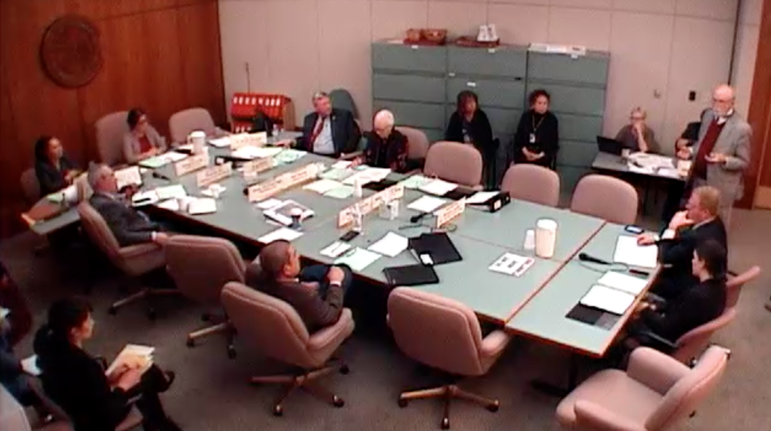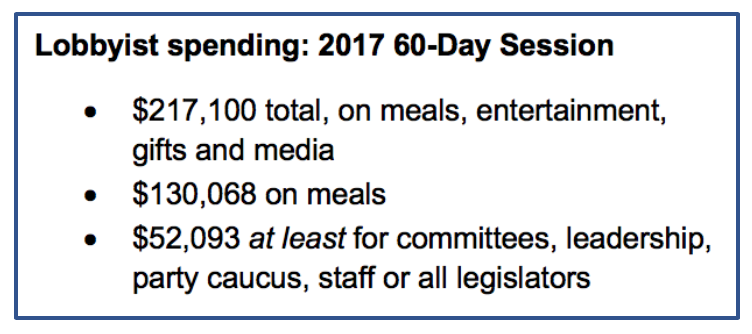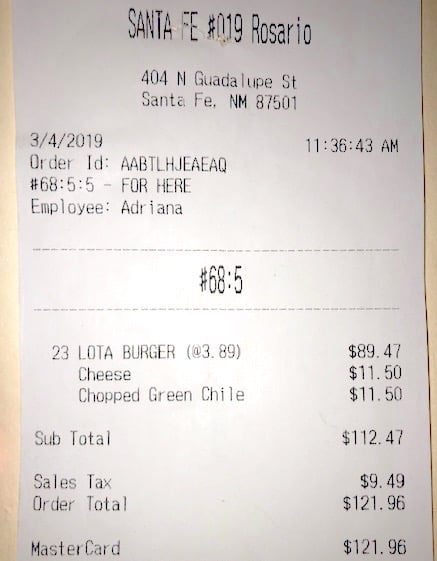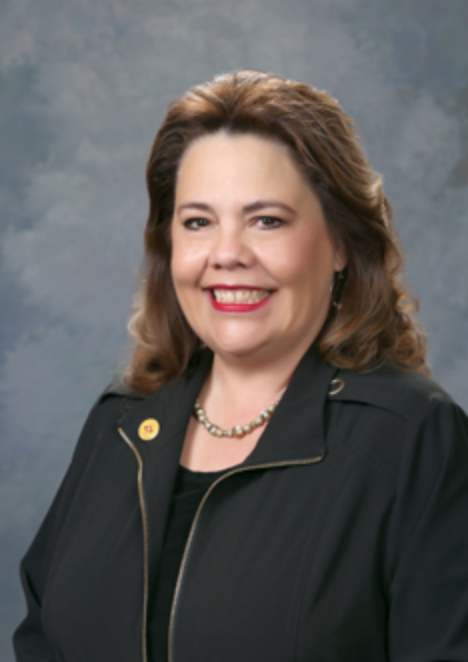
As the House of Representatives geared up for a late night on the floor last Monday, a group of lobbyists were asked to provide dinner for legislators: green chile cheeseburgers from Lota Burger.
A few days later, on Thursday, Rep. Jane Powdrell-Culbert, R-Albuquerque, thanked a group of “lobbyists, about 40” who paid for what’s now an annual tradition — a catered lunch for House members from her extended family’s restaurant, Powdrell’s barbeque. The mood on the floor was jovial.
To some, the displays did not quite square with the lawmakers’ vote the previous Sunday to ban lobbyist spending on lawmakers during a legislative session.
The ban was tacked onto a lobbyist transparency bill by Republican minority leader Jim Townsend of Artesia with minimal debate, and the bill passed unanimously. As amended, House Bill 131 would upend the culture of the Roundhouse, where lobbyists and their employers spend hundreds of thousands of dollars each session paying for receptions, banquets, committee and other more intimate meals, not to mention ski passes and occasional haircuts.

But things are not always what they seem in the Roundhouse. Longtime political players have repeatedly described the amendment to New Mexico In Depth as a way to kill the bill. A “poison pill” is what it’s called around the Roundhouse.
Before, HB 131 was a simple measure, one that would bring significantly more transparency to the lawmaking process of legislative sessions in which a slew of bills important to various constituencies are passed, often under the radar.
As the bill navigated through the House, legislators lobbed concerns in its path. A concern repeatedly cited was that it might overburden or hurt lobbyists who lawmakers rely on, and in some cases are their friends.
New Mexico In Depth talked to numerous full-time lobbyists about how the reporting requirement, and now the ban on spending, would affect them.
None of the lobbyists NMID talked with seemed particularly thrilled about the idea of more reporting. But no one voiced particular opposition, either. One produced a list he was carrying around, amid stacks of heavily notated pages of legislation.

But when it comes to spending during the session, all of the lobbyists NMID spoke with had opinions, in some cases, passionate ones. The outpouring of opinions, in fact, has been remarkable.
Those who spoke on the record largely verbalized what a larger group of lobbyists have said over the past week, who sought out New Mexico In Depth to talk about HB 131 but did not want to be quoted.
In a nutshell, lobbyists are hit up a lot to spend money on lawmakers during the session, they say. A big part of the reason is that New Mexico lawmakers are unpaid.
Longtime lobbyist J.D. Bullington, who contributed to the Lota Burger cheeseburger meal, said such meals are part of the fabric of Roundhouse culture. And they may be an important source of funding for many unpaid legislators who receive $161 a day for lodging and food during each year’s session.
But not all lobbyists have big expense accounts, they’re paying for meals out of their own pocket.
HB 131’s core intent: Greater transparency
Long a bringer of transparency bills, Sen. Jeff Steinborn, Democrat from Las Cruces, likes to say that the most effective way to pass a bill is to keep it simple, with just one idea at a time.
HB 131 initially was straightforward: require registered lobbyists to report to the Secretary of State two weeks after the end of a session all the bills on which they spent substantial time and effort lobbying lawmakers, and their position on the bills if they took one.

This is the third time Steinborn has sponsored this particular effort to increase lobbyist reporting, joined this year by House sponsors, Dayan Hochman-Vigil and Liz Thomson, Democrats of Albuquerque. The House bill now has just one committee assignment in the Senate standing in the way of a full Senate vote.
“I don’t have a problem filing an additional report saying here’s all the clients I registered to represent and here are the bills we took an interest in and tried to influence the outcome. I don’t see the big deal in that,” said Bullington, who has been lobbying on behalf of numerous clients for 23 years and has long made extensive campaign contributions and expenditures on lawmakers.
Linda Siegle, who’s been lobbying for various clients since 1992, said she might have to keep more notes, but that generally speaking, “I know which bills I’m working to kill and which I’m working to pass. We all know that.”
Steinborn acknowledged in an interview that a “major dimension” was added to HB 131 with the amendment banning spending on lawmakers, but at the end of the day he hopes senators stay focused on the bill’s original intent.
“It’s crucial that we not lose focus on the main point of the bill, which would be a huge leap forward for transparency,” he said. “Whatever happens as we move forward, we shouldn’t allow the amendment to stop the bill.”

His view is shared by longtime democratic lawmaker Patricia Lundstrom, chair of the House Appropriations and Finance committee, who specifically spoke in favor of the reporting during the House debate.
“There’s not a day that goes by that you don’t see major conflicts of interest,” she said. “What you see are things that are not reported. I like the idea of being able to see what people are working on, who their employers are, and have that recorded. Sometimes you have lobbyists who have conflicts even among their own clients. And you stand there and say, wait a minute, what hat are you wearing today?”
That Amendment
The major ticket item in lobbyist spending reports each session is food. Lot’s of it — and it’s not just those cozy restaurant meals that fire the public’s imagination. Lobbyists are also helping fund the state Legislature, by providing breakfast, lunch and dinner for lawmakers while they’re working.
It’s the lobbyists themselves mainly who organize such meals, Siegle said. “It’s difficult up here, when you’re coming up here staying in a hotel or condo, and buy your own meals, the per diem barely covers expenses, if it does. It’s nice to go out to dinner, it’s hard not having a salary or a meaningful per diem.”
Nonetheless, “a lot of us do tire of” paying for meals, Siegle said, noting that she doesn’t usually have clients who will pay for the dinners, forcing her to dig into her own pocket. When she first started lobbying there were dinners, but not to the extent there are today, at restaurants like the Bull Ring or Rio Chama. “There are two or three a week, for committees and staff, caucuses, leadership.”
As to why legislators would pass a bill banning such spending while continuing to participate this session, “It’s hard to say, maybe they’re tired of it too,” she said. “It doesn’t look good, really.”
Richard Romero, a former legislator who served as president pro tem of the State Senate from 2001 to 2004, and has been a lobbyist for various clients since 2005, says taking legislators out for a meal is valuable for finding the dedicated quality time he needs with them.
“I’m not trying to influence their behavior so much as trying to educate them,” he said. “That’s important.”
But most of that sort of education comes in the months between legislative sessions, not necessarily during the session, he said.
Charles Goodmacher has been lobbying for the National Education Association for 6 years, and thinks the lobbyists who buy meals during the session have an advantage over “Joe teacher” back home.
That’s because it’s during the session that specific, detailed legislation is being passed. “At the moment legislators are up against the wall on whether to vote yes or no, or suggest a change, is the moment a well-funded lobbyist can buy the legislator lots of meals and drinks.”
“I think the job of legislators is enormously hard, I’m not slighting a single one of them who listen to the people who take them out to dinner,” he said. “It becomes too easy, though, to forget Joe teacher in Deming or Belen who helped you on your campaign.”
Goodmacher said a ban on such spending would make it harder on New Mexico’s citizen legislators; the solution is to pay them. “We need to pay legislators a salary, or substantial stipend, or provide them year round staff support.” (The House has passed this session a House Joint Resolution, HJR 5, to put before voters the question of whether to pay lawmakers.)
Other lobbyists New Mexico In Depth talked with agreed.
“Absolutely, we’re at that point,” Romero said, “It’s time.”
Bullington said a paid legislature would put lawmakers on a level playing field. Currently, some rely on lobbyists to help them get up to speed on a wide range of complex issues, and that often happens over a lobbyist-paid meal, he said.
“If you want a really well-informed, independent legislature, you’re looking at a paid legislature with a full-time paid staff,” he said. “I think that would move this state forward. It would be a positive change.”
Of all the lobbyists New Mexico In Depth spoke with, Bullington had the most decisive views about lobbyist reform. He said the culture of lobbyists pooling resources to feed lawmakers isn’t the real issue, given they are unpaid, and circled back to the idea of transparency.
“It’s benign when a group of lobbyists are assembled to collectively pitch in to buy a large group of lawmakers a meal — hamburgers, breakfast burritos, a committee dinner at a restaurant — in exchange for very little recognition,” he said. “Lobbyists see that as a courtesy and part of the fabric of the process.”
That sort of spending is different from the more exclusive dinners that are meant to actually help a lobbyist influence the outcome of a vote on behalf of clients, he said. Bullington thinks there should be full disclosure during the session “when lawmakers are intertwined with the lobbying process and enacting legislation” rather than waiting until May, when lobbyists must file reports.
“Lobbyists should report everything they purchase for lawmakers, down to the most basic gin and tonic,” he said. “I wouldn’t find it difficult at all.”